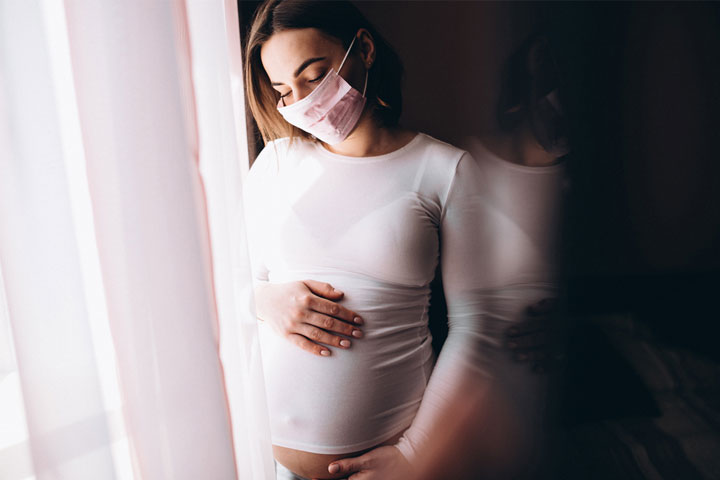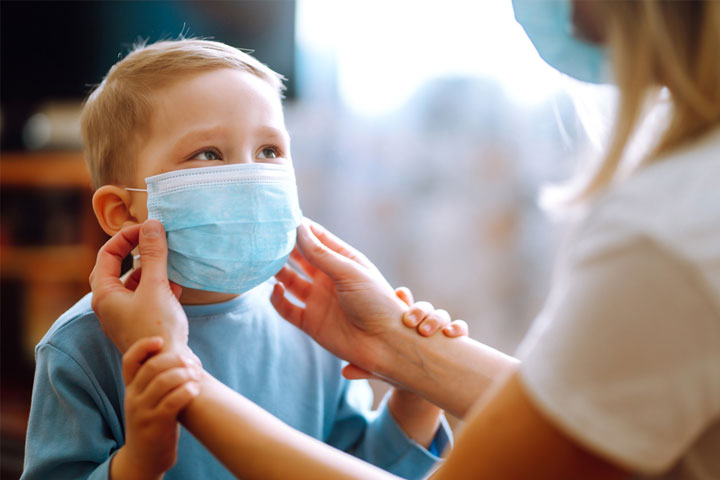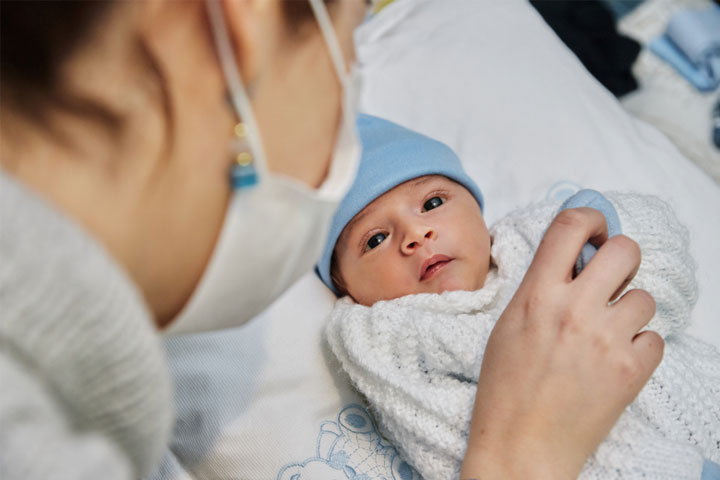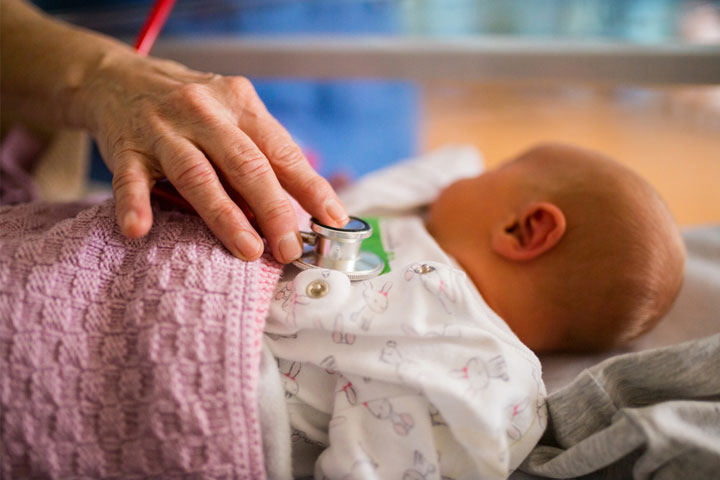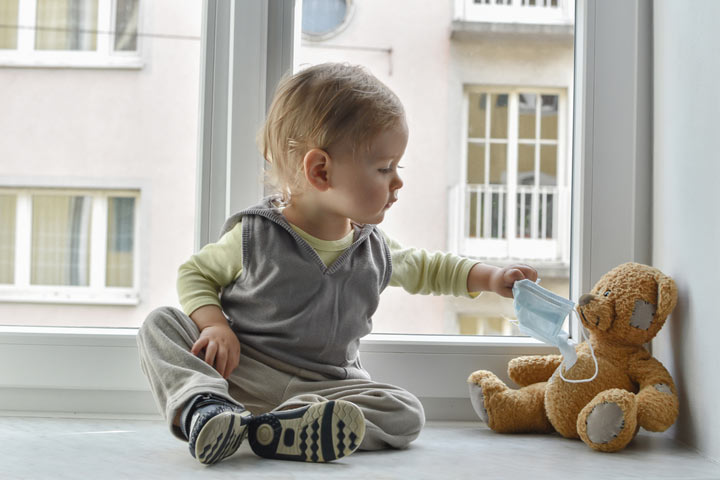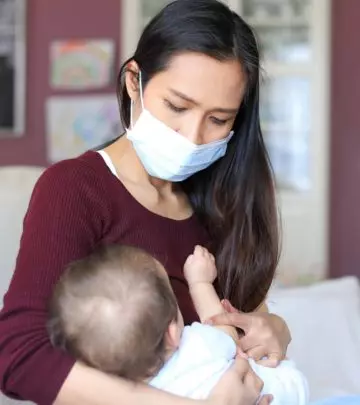
Image: Shutterstock
While coronavirus seems to be milder in young children, kids and babies can get infected with SARS-CoV-2 and be carriers of the disease. Children who are infected with the virus typically don’t show any major symptoms. However, there are cases where kids have become just as sick as adults, leading to deaths in some cases (1) (2). Hence it is important to know how coronavirus affects newborns, the symptoms, and what measures you can take to prevent the spread of the virus in babies.
How Likely Is It For A Newborn To Become Infected With COVID-19?
Though very rare, women who are infected with the virus can, in fact, pass it to their babies. Newborn babies have also tested positive for the virus shortly after birth. According to the U.S. Centers for Disease Control and Prevention (CDC), most babies who get infected with the virus show very mild symptoms or sometimes none at all. It has been found that the majority of newborns recover quickly. However, there have been cases with severe complications. Hence, pregnant women must take extra care to make sure they don’t get infected with the virus (3).
COVID-19 Symptoms In Babies And Children
The symptoms of coronavirus for children and adults tend to be similar, but it may be milder and cold-like in kids. The symptoms for COVID-19 include the following (4) (5):
- Fever
- Cough
- Sore throat
- Difficulty in breathing
- Nausea or vomiting
- Fatigue
- Headache
- Diarrhea
- Nasal congestion or runny nose
- Poor appetite
- Pink eye (conjunctivitis)
- Loss of taste and smell (babies may show a change in their eating habits) (6).
- Change in behavior or mood, such as feeding difficulties, frequent tantrums, or sleeping less or more often.
- Muscle aches — trouble sleeping, frequent crying, and moodiness in babies and toddlers.
Symptoms such as cough and fever are seen in both adults and kids alike. Shortness of breath or difficulty breathing is a symptom that is more commonly seen in adults. Kids can experience other symptoms such as excessive fatigue, sore throat, or diarrhea. They can also have pneumonia without any obvious symptoms.
If your child exhibits any of the above symptoms of COVID-19, contact your child’s health care provider immediately. Try to keep your child away from other family members and have him/her use a separate bedroom and bathroom, if possible. Follow the isolation and quarantine protocol issued by your government related to COVID-19.
Based on your child’s symptoms and the location you live in, your doctor may recommend getting a test done or prescribe some medicines. If your baby falls in a higher risk group or has been in contact with an infected person, your doctor may consider testing your baby.
How To Monitor A Baby
Unlike adults and children, babies need close monitoring as they are unable to express the symptoms they might be experiencing verbally. So, parents and caregivers need to evaluate their health by close monitoring. You could perform temperature checks and look for signs of difficulty in breathing (7).
Below, we list down a few signs of respiratory distress in babies:
- Rapid breathing — check if your newborn baby takes more than 60 breaths in a minute.
- Snoring sounds — lookout for snoring sounds while breathing.
- Grunting.
- Flaring of nostrils in newborn babies.
- Check if the muscles of the rib cage get sucked in while your baby is breathing.
Babies who are very young may also show feeding difficulties. A study found that babies below the age of 2 months had trouble eating and fever, but no cough.
When To See A Doctor
Babies who are infected with the virus can develop serious complications. These include heart failure, organ failure, sepsis (which can damage the organs), and hypoxia (8).
Some children have also shown severe inflammation post getting infected with COVID-19. It is a serious condition that can affect several body organs and is referred to as multisystem inflammatory syndrome in children (MIS-C).
Below are some signs of severe inflammation to look out for:
- High fever
- Bloodshot eye
- Rash
- Exhaustion
- Chest pain
- Intense stomach pain, nausea, vomiting, diarrhea
Though mild to moderate symptoms of COVID-19 usually resolve within a week, it’s important to contact your baby’s health care provider. The doctor may recommend getting a test done or would ask you to monitor a few symptoms.
If your child’s symptoms get worse or they start developing these symptoms, it’s’ important to contact your doctor:
- Rash
- Difficulty feeding
- Lethargic behavior
- Sunken eyes
- Signs of confusion, such as constant sleeping.
- Trouble breathing or signs of respiratory distress.
- Signs of organ damage, such as decreased urination or irregular heartbeat.
COVID-19 Treatment And Prevention Tips
Since there is no cure for COVID-19, doctors primarily focus on treating the symptoms. The baby might be hospitalized in some cases for monitoring. They might also need oxygen treatment and intravenous fluids. Babies who are breastfed may be given pumped breast milk through feeding tubes in case of feeding difficulties (9).
However, you can always take steps to reduce the risk of the virus in the following ways:
- Limit visitors.
- Avoid stepping out as much as possible.
- Follow proper hygiene and wash hands every time you come back from outside.
- Wash hands every time you come in close contact with someone from outside or touch mails or packages.
- Wear a mask when out in public.
- Practice social distancing when outside.
Though most babies recover from COVID-19 without any severe complications, parents should take necessary precautions to protect their baby from the virus. If your baby shows any symptoms of the virus, try not to panic and contact your baby’s doctor right away.

